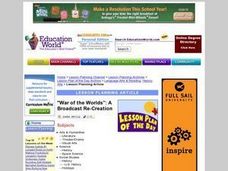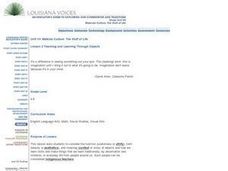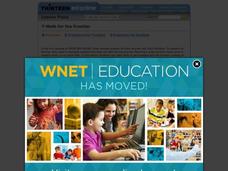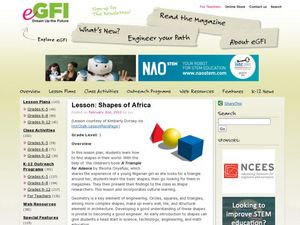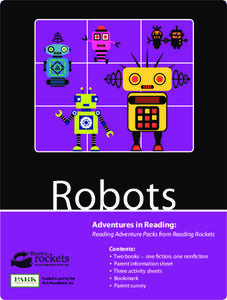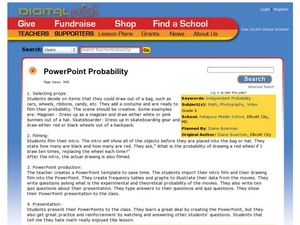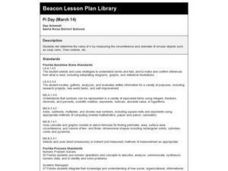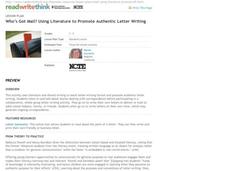Curated OER
Exploring Geometry in the Real World
Students find real-world examples of a variety of geometric shapes. They conduct research, record observations, and write descriptions. They create a classroom cityscape and highlight the information they gathered. They present an oral...
Curated OER
Subject and Object Pronouns: Challenges
Enhance problem solving skills while refining grammar proficiency with a learning game focused on subject and object pronouns. With playing cards in hand, class members create a dialogue in which one presents a problem while the other...
Curated OER
"War of the Worlds": A Broadcast Re-Creation
Why did Orson Welles' 1938 Broadcast of a adaptation of H.G. Wells' The War of the Worlds cause such a panic? To answer this question, class members listen to the original broadcast and research the panic that resulted. They then engage...
Curated OER
Teaching and Learning Through Objects
Students identify and interpret the function, usefulness or utitlity, form, beauty or aesthetics, and meaning, context or story, of objects and how they learn new skills and make things that they learn traditionally, by observation and...
Curated OER
Four Estimating the Area of Small Objects Problems
In this estimating area learning exercise, students work with their families to draw four small objects found around their house and estimate the area of each object.
Curated OER
Measurement and Conversion of Units in a Recipe
In a cross-curricular measurement and literacy instructional activity, your class will identify and compare cooking measurement instruments. They read a recipe and sequence a set of similar instructions in which the steps have been mixed...
Curated OER
Where in the World is Tacky the Penguin?
First graders complete activities related to they story they are reading in class. Through art and measurement activities, 1st graders relate a story from the "Tacky the Penguin Series" to everyday objects and ideas they encounter.
Curated OER
Math for the Frontier
Make history come to life by using the Frontier House series to engage learners in the past. Your class will "prepare" for a trip to 1833 Montana. They will learn about homesteading, frontier life, inflation, and cost of living. Using...
Curated OER
The Wonderful World of Colors
First graders imagine what life would look like in one color, then many. They play a game with colored cards where students call out the names of colors. They match colored cards with objects of same color. They read "The Color Box."
Curated OER
Shapes of Africa
First graders learn the names of geometric shapes and about African cultures. In this geometry and culture lesson, 1st graders describe real world objects and learn to name them with geometric terms such as square, circle, and triangle....
NTTI
Putting Together Ten
Groups explore sets of 10 items in two varieties (i.e. 3 white buttons and 7 black ones, or 5 bears and 5 bunnies). They brainstorm about their objects, write math sentences to represent what they have, and report their discoveries...
PBS
Reading Adventure Pack: Robots
Two activities work with a fiction and nonfiction book about robots‚—Robot Dreams by Sara Varon and Robot by Roger Bridgman. Scholars read each story, then build a robot out of found objects, examine robot sensors, and search for...
Curated OER
Transcendentalism and Romanticism in American Literature
How do transcendentalists believe you must learn about the world? Use this PowerPoint to define transcendentalism and explain reason and intuition. Social, political, and philosophical influences of this time are introduced, and a few...
Curated OER
Uncle Sam Wants You!
Students examine several narratives exploring attitudes to World War II involvement at the time. They develop their own opinions and write a fictional personal narrative to record their observations.
Curated OER
Take the Polar Express to Learning
Students complete a variety of activities surrounding the book, The Polar Express.
Curated OER
What's Your Angle?
Third graders read the story, Magic Schoolbus Inside the Human Body. Then they form right, acute, and obtuse angles using the joints inside their bodies. They write a brief summary about what they learned about angles as a review the...
Curated OER
PowerPoint Probability
Sixth graders investigate film making by creating a video about probability. In this math visualization instructional activity, 6th graders create a presentation for their class demonstrating the probability of random events taking...
Curated OER
Yes We Can! Students with Autism & Down-Syndrome on the Drums!
To learn about various topics and improve their social skills, learners with special needs play along with music on drums and other sound objects. Teachers take digital pictures of the young scholars participation and use them to make...
Curated OER
Honing in on Hummingbirds
Students explore ruby-throated hummingbirds. In this cross-curricular hummingbirds instructional activity, students listen to the book The Mystery of the Missing Hummingbirds and choose related topics to research with a partner....
Curated OER
Pi Day (March 14)
Fourth graders determine the value of ? by measuring the circumference and diameter of circular objects such as soup cans, Oreo cookies, etc..
Curated OER
The Me Book
Students relate to the pictures as symbols so that they come to point to named pictures, explain what pictured objects are for, match pictures to real objects, categorize objects, and recognize words.
Curated OER
Water: From Neglect to Respect
The goal of this collection of lessons is to make middle schoolers more aware of the ways in which they are dependent upon water to maintain their standard of living. Learners compare water use in Lesotho to water use in the United...
ReadWriteThink
Who’s Got Mail?
Today's kids are probably not familiar with the conventions of letter writing, due to the boom of technology. Here is a lesson that will provide opportunities for formal and informal letter writing.
Beacon Learning Center
Spotted Stones Linked Just Right
Discover how to play the game of dominoes using mental math skills to solve equations that earn points. Pupils become fast critical thinkers in determining which unknown addend tally up points in their favor.


